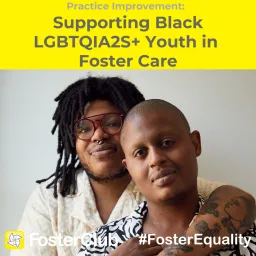Black youth and youth who are LGBTQIA2S+ are both overrepresented in the foster care system. For youth who identify as both Black and LGBTQIA2S+, managing this intersection* of marginalized identities in the child welfare system can be difficult, and can result in negative outcomes including mental health challenges, housing and placement instability, and barriers to positive permanency.
To help avoid these negative outcomes, the following are a few practice improvement suggestions to better support Black LGBTQIA2S+ youth in foster care**:
- Trauma-informed and culturally competent care should be provided to Black LGBTQIA2S+ youth in foster care, in order to manage the stressors related to simultaneous racism and anti-LGBTQIA2S+ sentiments they experience.
“One of the biggest changes I would love to see made in the system is increased awareness – education, resources, and more acceptance. If your child, or any child for that matter, is coming out to you, be sure to tell them that they are not any less valuable and help them to understand how they identify – educate them.” – former foster youth from Ohio
- This presentation from the American Medical Association explains the intersection of Black and LGBTQIA2S+ identities.
- This is an educational resource from the Trevor Project on the mental health experience of Black LGBTQIA2S+ youth.
- For mental health professionals in the child welfare system, here is a study on affirming cognitive behavioral therapy practices with LGBTQIA2S+ youth, and here is a best practice resource in working with Black LGBTQIA2S+ youth.
- Ensure the placements of Black LGBTQIA2S+ youth are accepting, affirming, safe, supportive and loving.
“Honestly, my answer to this problem would truly be that all foster parents are classified and screened to be able to take youth from the LGBTQ community. After stating the interest and ability to take in these youth, they should all go through further training on how to be a good support system for them.” – former foster youth from California
- The Family Acceptance Project is a hub of resources for foster parents and caregivers of LGBTQIA2S+ youth.
- PFLAG offers location-based chapters of parents and caregivers of LGBTQIA2S+ youth. Connecting with other caregivers is a way caregivers can ensure they are providing the best possible environment for the LGBTQIA2S+ youth they serve.
- Check out #FosterEquality’s resource on providing affirming and accepting care through using inclusive language!
- It is imperative that child welfare staff and caregivers talk to all youth about various SOGI (sexual orientation and gender identity) identities.
- Open conversations about identity removes stigma that “otherizes” non-heteronormative and non-White identities, thus increasing safety and wellbeing for everyone.
“I began to come out to my friends and other foster youth and was able to embrace and accept who I was.” – former foster youth from California
- FosterClub’s Foster Parent Online Training has a module for supporting LGBTQIA2S+ youth.
- Here is a resource on how to speak about SOGI with youth.
- Black LGBTQIA2S+ youth should always be involved in decision making both for their own case plans and also for best practice suggestions for the field.
- If youth are interested, engaging in community action and advocacy opportunities is a great way to explore the social intersections they exist within, which in turn promotes identity development, solidarity, pride, and hope for their future.
“I have, and continue, to believe that the designing and designation of exceptional and engaging services and programs for young people requires the authentic amplification and integration of the voices and unique lived experiences of those most marginalized.” – former foster youth from New Jersey
- This Deepening Constituent Engagement training is designed for child welfare professionals to learn how they can better incorporate youth voices into their practice.
- For caseworkers, The Administration of Children and Families has several available resourceson incorporating youth voices into case planning.
- For youth who want to get involved in advocacy, strategic sharing is the first step in making sure their advocacy is safe for them and impactful for their audience.
These practice improvement strategies can improve the wellbeing of Black LGBTQIA2S+ youth involved in the child welfare system. For information on how to prevent Black families with LGBTQIA2S+ youth from getting involved in the child welfare system, check out #FosterEquality’s resource on supporting Black families and Black LGBTQIA2S+ youth!
*“Intersectionality", coined by Kimberle Crenshaw, refers to the experience of more than one marginalized identity simultaneously.
**These resources may apply to many foster youth, but this blog specifically focuses on Black youth.
Sources
Center for the Study of Social Policy. (2016). Out of the Shadows: Supporting LGBTQ Youth in Child Welfare Through Cross-System Collaboration. https://cssp.org/wp-content/uploads/2018/08/Out-of-the-shadows-current-l...
Conron, K., Wilson, B. (2019). LGBTQ Youth of Color Impacted by the Child Welfare and Juvenile Justice Systems. The Williams Institute. https://williamsinstitute.law.ucla.edu/wp-content/uploads/LGBTQ-YOC-Soci...
Grooms, J. (2020). No home and no acceptance: Exploring the intersectionality of sexual/gender identities (LGBTQ) and race in the foster care system. The Review of Black Political Economy 47(2), 177-193. https://doi.org/10.1177/0034644620911381open_in_new

